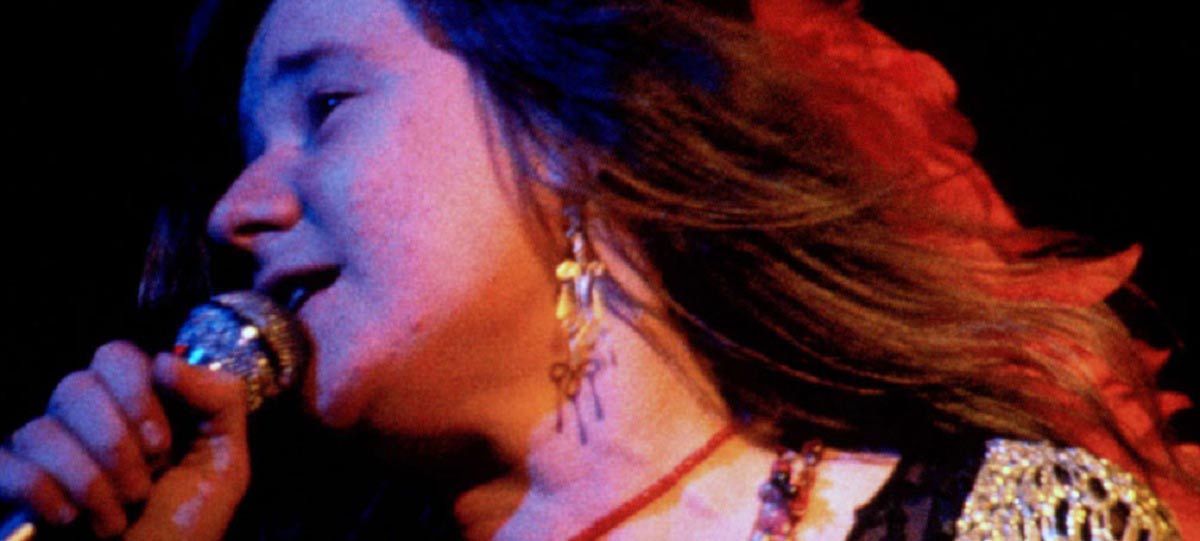Janis: Little Girl Blue (February 5, 2016)
A comprehensive and absorbing profile of the blues singer Janis Joplin, is directed by American filmmaker Amy J Berg, who in the spotlight for another reason. Her expose of child abuse by a Catholic priest, Deliver Us from Evil, won the Best Documentary Academy Award in 2006, and the title is summoned up in several reviews of this year’s Academy Award nominated film, Spotlight, about similar abuse, on a wider scale, in Boston.
Growing up in Port Arthur, Texas, Janis was not abused by her parents or priests but she was bullied throughout her formative years when she gained weight, her skin broke out, and she was ‘voted ugliest man on Campus’ in 1964. She joined the local choir but was kicked out and her low grades reflect a troubled child. A friend tells the camera: ‘She was a lot of trouble; she started fights.’ If you rocked the boat, Joplin discovered, you would get noticed, and Janis, longing for recognition and love, embarked on a life of rocking the boat.
Joplin left Texas for San Francisco never to return, writing ‘here you can do what you want and no one bugs you.’ But for her real escape from whatever bugged her, she just needed a guitar and an audience. She sings, she told an interviewer, ‘to experience a lot of things. You get to feel things that are in your imagination. I want you to get up and jump and feel the rhythm.’ Everyone who her heard her sing did.
Along with commentaries from her brother Michael and sister Laura, an inspired feature of the documentary, is singer/songwriter Cat Power reading from Joplin’s revealing letters to her family. She remained in contact with them, almost out of guilt, always trying to show that their troublesome child was a success. The film goes through her child hood, her many loves and many more lovers, — sometimes so quickly that we cannot keep track of whom she is talking about – but it is the anecdotes and the clips from her live performances that bring it all back and make it real.
We hear how one night in North Beach, San Francisco, she heard Otis Redding and ‘was so impressed with his Gotta, gotta, gotta, that she stole it’. We hear about Janis approaching her idol, Bob Dylan, informing him, ‘I’m going to be famous some day.’ He prophetically replied, ‘We’re all going to be famous one day.’
Big Brother and the Holding Company were the perfect band for Janis because, recognising she was more talented than any of them, they enabled her to shine. The band had their big breakthrough during the Summer of Love at the now famous 1967 Monterey Pop Festival – their first appearance at a large venue.
We first see a wonderful clip of Mama Cass from Jefferson Airplane mouthing ‘wow’ after Joplin’s resounding rendition of Ball n’ Chain and then see the standing ovation. Witnessing the audience’s reaction was Clive Davis, influential head of Columbia Records, who had just signed Simon & Garfunkel. He signed Big Brother and the Holding Company on the basis of their set at the Festival.
In 1968 the band had its first Gold Album and Janis writes home, ‘I’m 25. Twenty five! I was a mixed up kid and now I’ve made it.’ Fame landed Janis on many talk shows, but she became a regular on the Dick Cavett Show. Cavett, now 79, smiles at the camera, with a wry smile. ‘We may or may not have been intimate, I can’t remember. My memory is so bad.’
While recording the album Cheap Thrills, living in the Chelsea Hotel and hanging out with the great and the not-so-good was perhaps the happiest period of her life, Janis eventually outgrew Big Brother and started her own band, The Kozmic Blues Band. She apparently struggled because she had never had to manage a band before and be lead singer. And now, she was heavily into drugs, included heroin.
We hear of Peggy Casserta, a bad influence on Janis with whom she shot heroin while waiting to go on stage at the Woodstock Festival in 1969. Berg does not dwell on her performances at Woodstock or at Madison Square Garden where even the audience were betting on whether she would make it through the set standing up. But Berg does provide plenty of detail about Joplin’s battle with heroin, which was responsible for, among other things, alienating many of the men in her life.
Nonetheless, after leaving the Kozmic Blues Band, Janis had the good fortune of hooking up with producer Paul Rothchild who tells us, ‘she was always ready to do the most. She was a better singer than she or anyone realised.’ Her posthumously released second solo album Pearl was the best selling album of her career.
 Pearl included Howard Tate’s Get it While You Can and her two original songs, Move Over and Mercedes Benz. But the highlight was the song that Kris Kristofferson co-wrote and gave her, Bobby McGee. It became, along with Piece of My Heart and Cry Baby a signature song. Kristofferson appears on camera to describe how ‘her producer gave me a demo of Janis singing Bobby McGee in September 1970’ and his reaction to hearing it. ‘It’s a thrill that she made the song her own.’
Pearl included Howard Tate’s Get it While You Can and her two original songs, Move Over and Mercedes Benz. But the highlight was the song that Kris Kristofferson co-wrote and gave her, Bobby McGee. It became, along with Piece of My Heart and Cry Baby a signature song. Kristofferson appears on camera to describe how ‘her producer gave me a demo of Janis singing Bobby McGee in September 1970’ and his reaction to hearing it. ‘It’s a thrill that she made the song her own.’
The Landmark Hotel in Hollywood where she died of a heroin overdose is now a pilgrimage site, but the news of her death on October 4, 1970 at the age of 27 shocked the music world. In a way it’s a shame that Berg does not spend time on the Joplin tributes (Jefferson Airplane’s song Pearl and Lenard Cohen’s Chelsea Hotel 2 being just two) or Joplin’s legacy, but perhaps this is the subject of a documentary in itself. The film’s subtitle comes from Joplin’s cover of the song Little Girl Blue, which Nina Simone sang after Joplin’s death, while including Joplin in her song ‘Stars.’
Beyond the clear and comprehensive chronological coverage of her career and life, the wonderful thing about Berg’s film is its period feel, and the atmosphere and music of the 1960s which she evokes. Sitting next to me was a young critic who knew nothing about Janis Joplin. I just wished Berg had included one full set of Bobby McGee, or Piece of My Heart, sung from beginning to end with no interference, for his benefit. Or, if I’m being honest, for mine.




